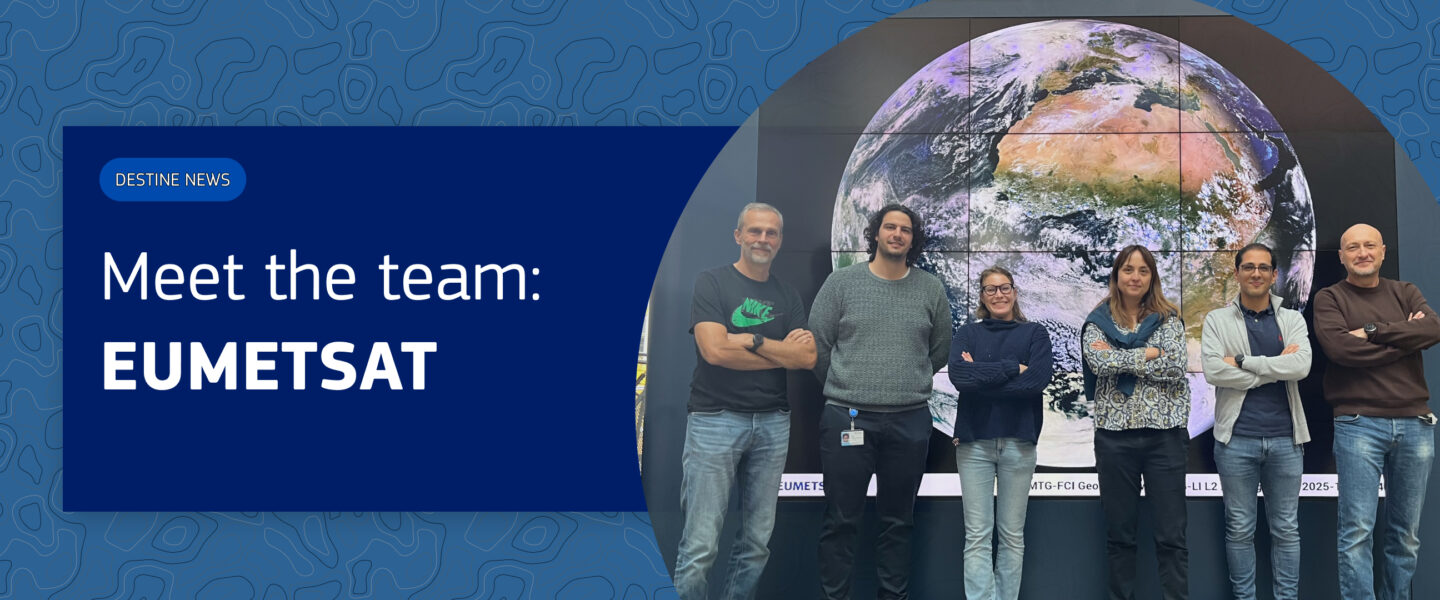Latest Challenge unveils future ideas for rising temperatures, climate forecasting and co-designed city planning
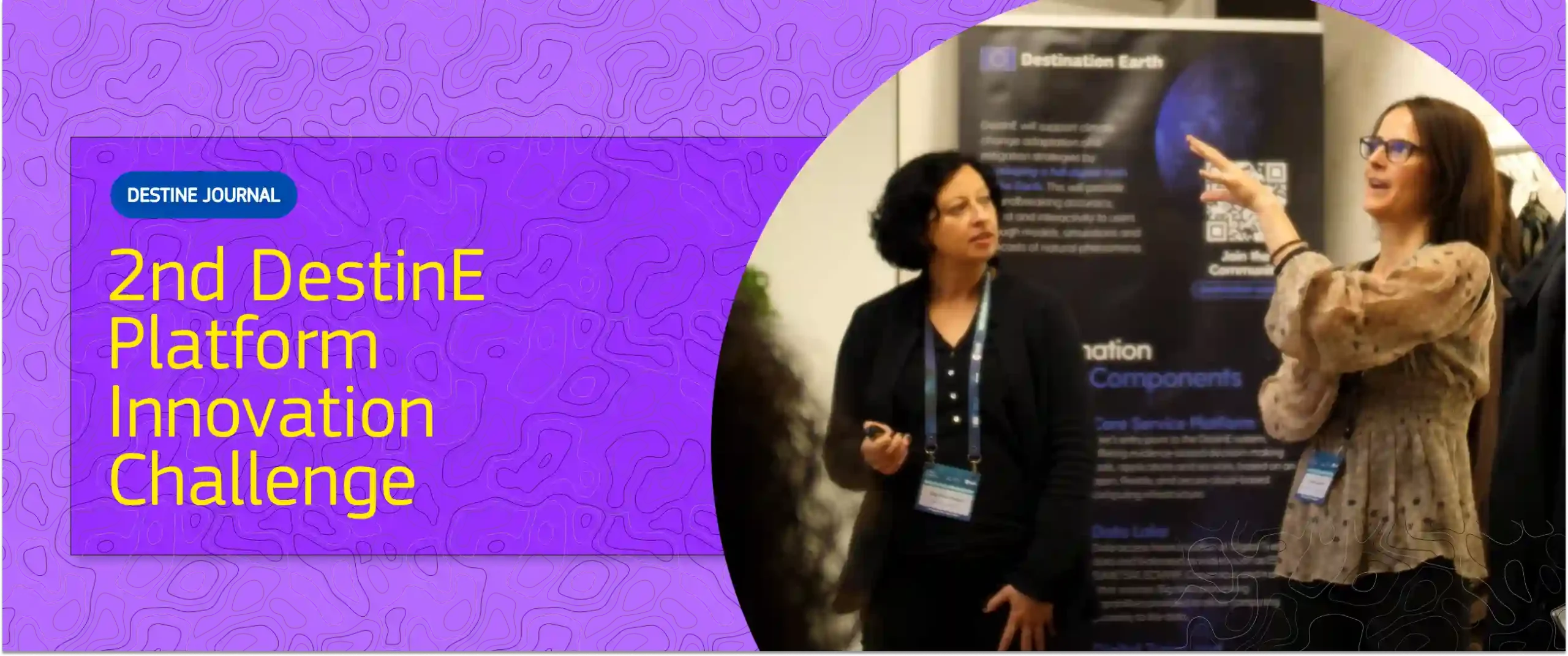
The 2nd DestinE PlatformSelf-standing DestinE system component, interfacing with the More Innovation Prize ran between 20 March and 21 April 2024, with the scope of Ideating the Impact of the DestinE PlatformSelf-standing DestinE system component, interfacing with the More, tapping into the creative imagination of DestinE community members.
Participants were invited to envision a future where everyone, especially policymakers and decision-makers have access to a Digital Twin of Earth and consider, imagine and share services that might exist in the future, inspired from narratives set in the year 2050.
Because at the time of this Innovation Prize, the DestinE PlatformSelf-standing DestinE system component, interfacing with the More was not open to the public, participants were asked to conceptualise and mock-up their services, culminating in the winners presenting their vision in a rich and enticing way to the DestinE community in an online event held on 19 June 2024.
The Innovation Prize received submissions with a total of 44 involved individuals from all spectrums: research and academia, private sector and general public, with interested individuals and organisations from as far as Australia (even though not eligible).
Three awards of equal stature were ready to be awarded, inviting the submission of a wide range of proposals. Some of these proposals were nearly ready for immediate use, while others, at an earlier stage of development and lower Technology Readiness Level (TRL), explored visionary ideas that could have a big impact in the future. These awards were as follows:
- Most promising proposal: a proposal that we can see happening from tomorrow morning, bringing a fresh look into an unseen circumstance.
- Radical Realities: a proposal that can have great impact on the lives of the people it serves even if it cannot yet start materialising tomorrow morning, either due to technical availability or people not willing to accept it in their lives.
- BlueSky Proposal: a proposal which stands out for its creativity and the profound impact it could ultimately have, marking it as a truly inspiring vision of the future, even if today it seems ambitious in terms of feasibility.
The judges, Danaële Puechmaille representing EUMETSATEuropean Organisation for the Exploitation of Meteorological, Joern Hoffman representing ECMWFEuropean Centre for Medium-Range Weather Forecasts More and Alexis Longuet representing SERCO, reviewed the submitted proposals based on their expected social and environmental impact, novelty, level of feasibility, how well they fit with DestinE’s vision and how appropriate they are presented through the visualised mock-up.
All three winning proposals have been awarded as prizes a 1-hour online tour of the DestinE PlatformSelf-standing DestinE system component, interfacing with the More, a 30-minute online tutoring session to discuss potential follow-up of their idea with a DestinE applications expert from Starion Group and a trip for one team member to ESRIN, to visit PHI Experience between 12-18 September 2024, during the URBIS24 workshop (URBan Insights from Space).
Most promising proposal
Title: DT-HEAT+
Team: Dr. Iphigenia Keramitsoglou et. al, National Observatory of Athens, IAASARS
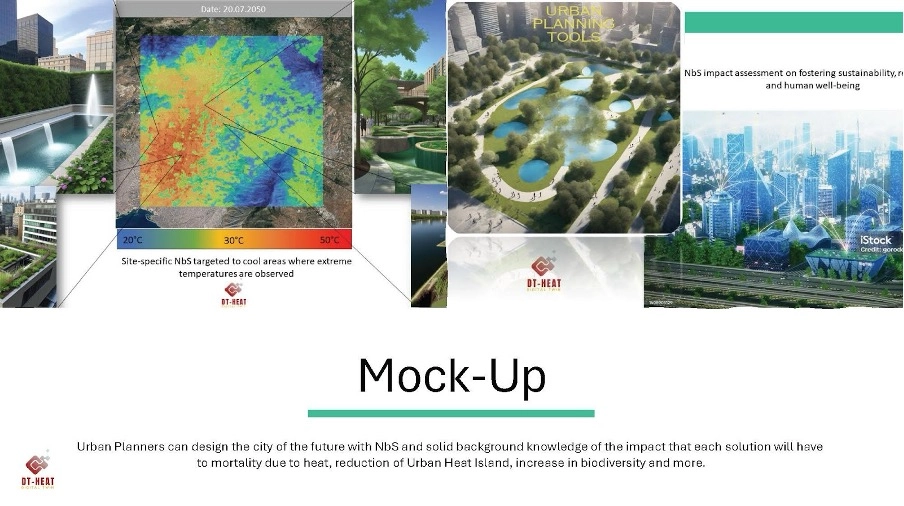
DT-HEAT+ leverages the digital twin technology provided by DestinE to integrate emergency services, nature-based solutions, and community engagement, transforming urban centres into resilient havens against extreme heat. It enhances emergency responses, improves urban ecosystems, and empowers vulnerable populations, fostering a sustainable, safe, and inclusive city environment ready for the challenges of 2050.
This proposal discusses extreme heat in cities and shares locations of heat relief to interested parties through a platform, concurrently predicting and sharing information with first responders in extreme heat events. On a second level, the project builds awareness of ways to combat extreme heat on an individual level, and offers a related educational gamified experience for children.
As Dr. Iphigenia Keramitsoglou states, once DT-HEAT+ is a reality “Cities will be transformed into resilient, sustainable environments where nature-based solutions and advanced technology work hand in hand to mitigate the effects of heatwaves.”
“Vulnerable populations, particularly the elderly and low-income communities, will benefit from targeted interventions that ensure their safety and well-being. Emergency services will respond more effectively to heat-related incidents, reducing mortality rates and improving public health outcomes,” Dr. Keramitsoglou added.
To see the proposal moving into implementation, the team would “greatly benefit from a robust network of stakeholders including city planners, environmental NGOs, policymakers, and technology providers. Collaboration with leading research institutions and climate scientists would enhance our data accuracy and predictive capabilities.”
To find out more about the project, and get in touch with the team, follow the link here.
Radical Realities
Title: TwinSphere
Team: Eteoklis Frydas, student, Aristotle University of Thessaloniki
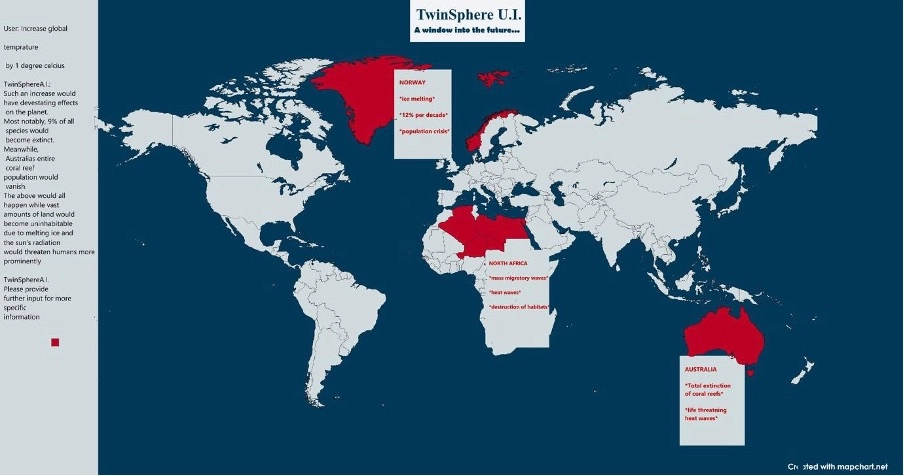
TwinSphere is a high-technology digital twin of the earth’s surface. By employing the power of A.I., the digital twin aims to open a window into the future, by accurately simulating multiple parameters that affect the earth’s climate. The user will be able to simulate human activity, natural disasters and climatological changes in a single interface, in order to test scenarios and pave the right way for the future. In addition, a secondary function will also offer a monitoring capability, allowing users to easily locate and respond to impending or ongoing natural disasters.
This proposal combines a chatbot with Earth Observation in an online experience where the Data Lake, and consequently DestinE, gets a “voice” of its own, responding via text as if it were Earth’s intelligence. It was considered an interesting proposal in the expectation it builds up towards, since it combined satellite data along with data from the natural environment (e.g. animal movement patterns) to generate conclusions to user asked scenarios and showcase implications.
Frydas notes that should TwinSphere become an everyday accessible service, it “…will truly open a window into the future and show the exact consequences of every action with unmatched precision, effectively shutting down all adversity and resistance to climatological solutions, by showing their real, undoubted impact.”
To do so, one of the main challenges is to decipher the multitude of organisations and actors that are capable of providing the necessary data and resources to support the system’s A.I.
To find out more about the TwinSphere proposal, read or download the description below.
BlueSky Proposal
Title: Henry the city tweaker
Team: Peter Kalverla, Jesus Garcia González, Netherlands eScience Center
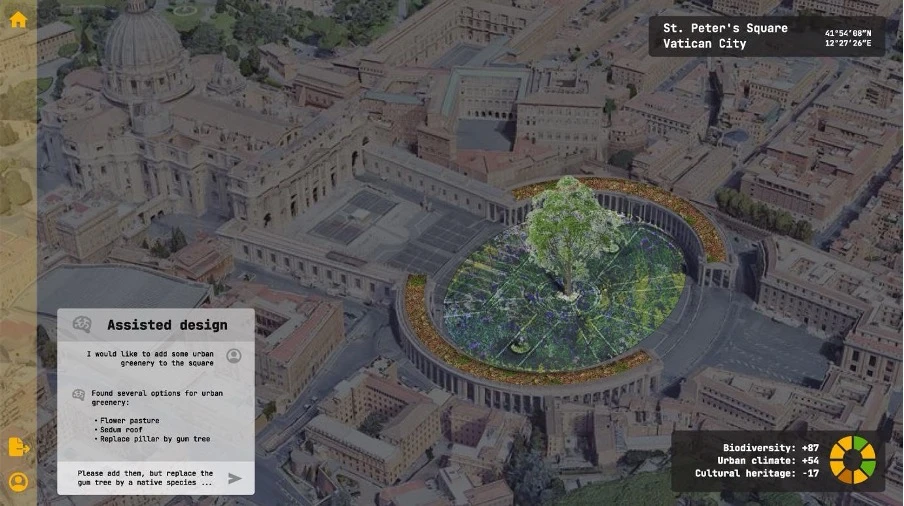
Given in the form of a story about Henry, the proposal alludes to games of urban sims, but brings them to the real world, addressing real citizen needs. In this new reality, design proposals with a net positive impact are eligible for execution, on the condition that they gather sufficient support. This story follows Henry as he experiences the rise of city tweaking firsthand.
Based on urban sims, gamification and Earth Observation, the proposal envisions a co-design approach for city planning in the form of a game engine, where any community member can be a ‘tweaker’ of their surroundings in this online tool, decision makers can turn targets into design challenges answered by the community and DestinE is the enabler of all this paradigm shift. It is an ambitious proposal, yet well fit to envisioning a preferable future.
Should this proposal become a reality, Kalverla believes that “… urban planning and decision making will be more transparent and democratic. Besides that, the proposal implements an economic model that incorporates the wellbeing of human and nature. As such, it provides a scientific basis for a free market that works for humans and nature, instead of against them.”
Additionally, in a true participatory citizenship fashion, in order to develop the building blocks or this proposal, the winners envision the organisation of sprints and hackathons with diverse experts, such as economists, climate scientists, urban planners, game developers, relevant business & consultancy firms, and municipalities, in order to co-develop aspects of this vision, before ideas and prototypes seek funding.
To find out more about the story, the project, and get in touch with Peter and Jesus, follow the link here.
Follow the link below to view the presentations of the winner in the community event of 19 June 2024.
